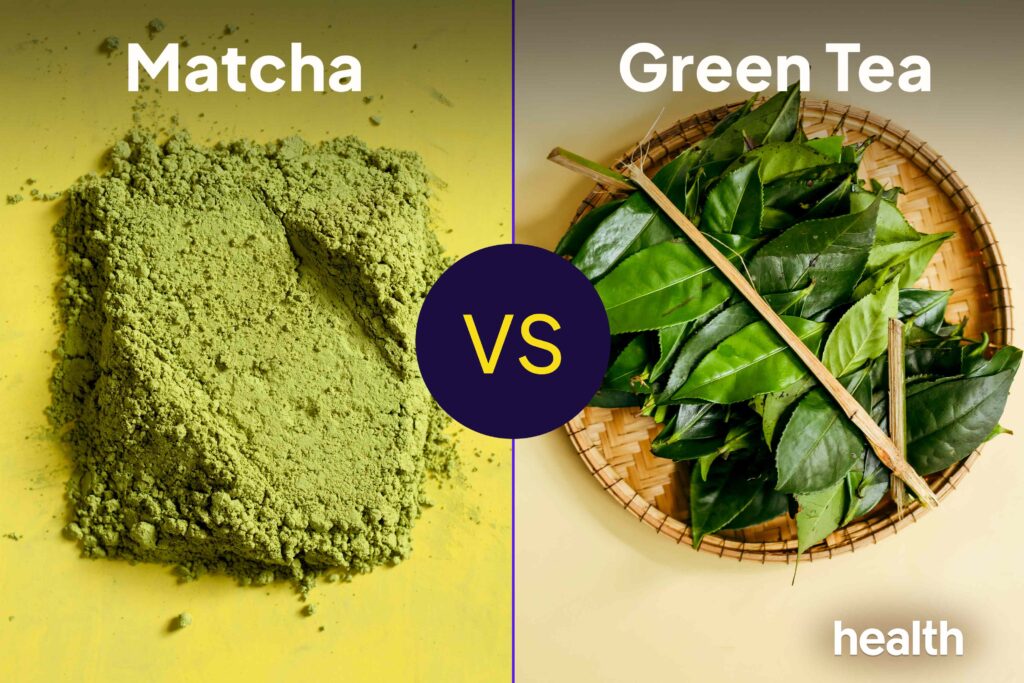| Matcha | Green Tea | |
| Calories | 5 | 2.5 |
| Caffeine | 37+ mg | 29 mg |
| L-theanine | 9.3-28.51 mg/g | 6.56 mg/g |
Green tea and matcha provide different levels of caffeine, L-theanine, and antioxidants, which influences their impact on health.
Antioxidants
Matcha contains significantly higher levels of antioxidants, such as catechins and vitamin C, making it a better choice for antioxidant benefits than green tea.
“Matcha and green tea contain numerous active compounds, including L-theanine, rutin, quercetin, caffeine, chlorophyll, and multiple catechins,” explained Kiran Campbell, RDN.
Diets rich in antioxidants, which are primarily concentrated in plant foods, like fruits, vegetables, and tea, have been linked to a wide range of health benefits, including a lower risk of conditions like heart disease and certain cancers.
Energy and Focus
Due to its higher caffeine content, matcha offers a more potent natural energy boost than green tea.
However, matcha’s high levels of L-theanine, a calming amino acid, help balance caffeine’s stimulating effects. This makes matcha a good option for those who want sustained energy without the jitters often associated with coffee.
Heart Health
Research shows that green tea consumption is linked to a lower risk of heart disease. Regularly consuming green tea may help lower inflammation and heart disease risk factors like high cholesterol and high blood pressure.
Matcha may offer similar heart-protective effects, though research is limited.
Metabolism and Weight Support
Green tea extracts are commonly included in weight loss supplements because their natural caffeine and catechin content can modestly increase fat oxidation and calorie burning.
Since matcha contains higher levels of both caffeine and catechins, it may offer a slight edge over regular green tea for supporting weight loss. However, no single food, beverage, or supplement can cause significant weight loss on its own. Lasting results require sustainable dietary and lifestyle changes.
Consumption of green tea has also been shown to significantly reduce fasting blood sugar, insulin levels, and hemoglobin A1c (HbA1c), a long-term marker of blood sugar control, making green tea a good choice for metabolic health.
Brain Health
The higher concentrations of L-theanine in matcha could make it more potent for brain health, green tea is an excellent choice, too.
“The L-theanine in matcha is known to improve brain health, including improved memory, attention, and reaction time,” explained Best. “The caffeine content also helps to improve brain function,” she said.
L-theanine also has brain-protective properties and may protect brain cells from age-related damage and reduce the risk of cognitive conditions like dementia. In fact, research shows that people who drink green tea regularly are at a lower risk of developing dementia.
Green tea and matcha are both healthy choices, so which you choose depends on your taste preferences, caffeine tolerance, and health goals.
However, there are some things to keep in mind before making your decision.
“Green tea is easier to prepare than matcha, requiring only a cup of hot water,” noted Campbell. “It’s also a better choice for those with high blood pressure or sensitivity to caffeine since it contains less caffeine than matcha,” she said.
Because matcha has a richer, more intense flavor than green tea, it’s often prepared with added sweeteners or calorie-containing ingredients like milk or coconut milk. To keep your drink lighter, opt for unsweetened preparations or use safe, non-caloric sweeteners such as monk fruit. Green tea’s milder taste may make it easier to enjoy without added sweeteners.


